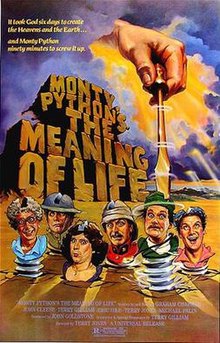Monty Python's The Meaning of Life
| Monty Python's The Meaning of Life |
|
|---|---|

Theatrical release poster
|
|
| Directed by | Terry Jones |
| Produced by | John Goldstone |
| Written by | |
| Starring |
|
| Music by | John Du Prez |
| Cinematography |
|
| Edited by | Julian Doyle |
|
Production
companies |
|
| Distributed by | Universal Pictures |
|
Release date
|
|
|
Running time
|
90 minutes |
| Country | United Kingdom |
| Language | English |
| Budget | $9 million |
| Box office | $14.9 million |
Monty Python's The Meaning of Life, also known as The Meaning of Life, is a 1983 British musical sketch comedy film written and performed by the Monty Python troupe, directed by one of its members, Terry Jones. It was the last film to feature all six Python members before Graham Chapman's death in 1989.
Unlike Holy Grail and Life of Brian, the film's two predecessors, which each told a single, more-or-less coherent story,The Meaning of Life returns to the sketch format of the troupe's original television series and their first film from twelve years earlier, And Now for Something Completely Different, loosely structured as a series of comic sketches about the various stages of life.
Released on 22 April 1983 in the United Kingdom, The Meaning of Life, although not as acclaimed as its predecessors, was still well received critically and was a minor box office success, grossing almost $15 million on a $9 million budget. The film has a 90% rating on Rotten Tomatoes, and appears in a 2010 list of the top 20 cult films published by The Boston Globe.
The film begins with the short film The Crimson Permanent Assurance, where a group of elderly office clerks working in a small accounting firm. They rebel against yuppie corporate masters, transform their office into a pirate ship, and raid a large financial district. The rest of the film is split into seven chapters made up of distinct sketches.
The first, “The Miracle of Birth”, features a woman in labour being ignored by the doctors in favour of impressing the hospital’s administrator, then accuse her of applying gender roles after the baby is born and she asks about its gender. In Yorkshire, a Roman Catholic man loses his jobs and returns home, instructing his children on the church’s opposition to contraception, leading to the musical number “Every Sperm is Sacred”, before selling his children off for scientific experiments. Meanwhile, a Protestant man and his wife discuss having non-reproductive sex.
...
Wikipedia
